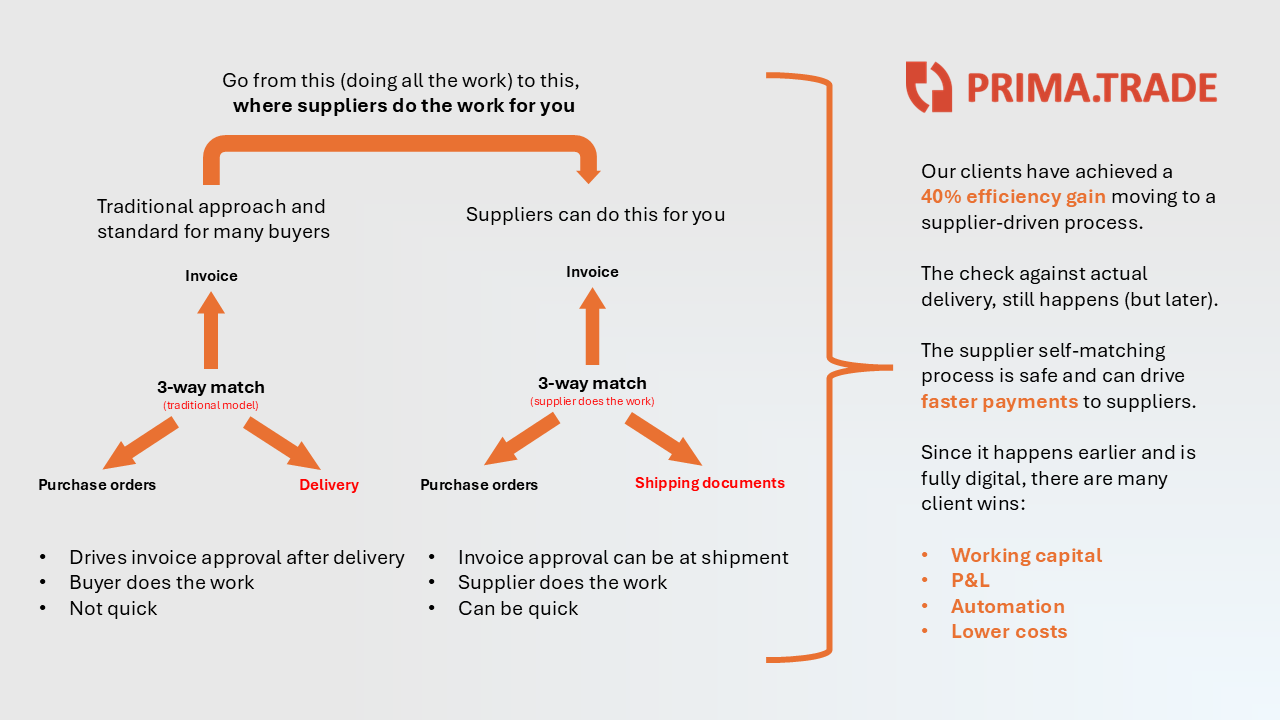Supplier self-matching, suppliers do the work
Most companies work in a relatively simple way with their suppliers:
Purchase order goes out to the supplier.
Supplier invoice comes back.
The accounts payable team does a 3-way match to approve the invoice for payment. The means comparing the:
Good receipt notice ("GRN", ie: delivery)
with the Purchase Order
with the Invoice
Then the invoice is posted to the accounting system together with any adjusting debit notes.
There are plenty of tools available to help with these processes, but inevitably, the traditional approach means:
A relatively heavy team at head office
Invoice approvals are not very quick
There's a better approach. Get suppliers to do the work.
Supplier self-matching enables invoice approvals to be automated and quicker - even before delivery. Suppliers do the work. And this can lead to:
Working capital wins
Significant P&L savings on the costs of goods and services
Headcount efficiencies

Supplier self-matching - digitise and get rid of the paperwork!
Read on to see how this works and why it is such a big win.
Self-matching in three steps
These three steps are described below in more detail.
The supplier:
Step 1: delivers the invoice digitally
Step 2: matches the invoice to open purchase orders
Step 3: provides other documents digitally (transport, delivery, etc) to show it has performed its obligations
The resulting package of data is used for a quick 3-way match on the PrimaTrade platform:
Shipment or delivery evidence to
Purchase order match to
Digital invoice
This is the same as the regular 3-way match except that the GRN (Goods receipt notice) is replaced with the data from transport and other documents; the transport and other documents evidence the supplier has performed its obligations.
Step 1: it starts with a digital invoice
Supplier self-matching requires invoices to be delivered by suppliers digitally.
The easiest way to achieve this is for suppliers to create their invoices directly in the buyer's accounting system. [Note, this is not the same "self-billing" when the buyer creates the invoice for the supplier - a process that has a host of complexities.]
There are many systems which enable this, some better than others. They typically require the supplier to create invoices in a specific format or to log into a portal and type in all the invoice data.
Getting the supplier to invoice digitally this cuts out a step for the buyer's accounting team. But it is not the end of the story.
Getting the invoice as data fields enables it to be posted automatically posted into the buyer's accounting system. This is much better than receiving the invoice as a PDF or file sent to the finance team by email or via in some kind of data exchange format.
PrimaTrade delivers this result in an even better way.
On the PrimaTrade platform, the supplier logs into our platform and simply drops a scan copy of its invoice (in any format) onto its dashboard - and our system pulls all the data off with the supplier checking and warranting the result.
There is no need for the supplier to create any additional versions of the invoice or for the invoice to be any specific format. The supplier also does not have to do lots of typing since any format of invoice works.
The result is a digital record of the invoice which delivers to the buyer:
All the data from the invoice, organised and checked by the supplier
A scan copy of the invoice in support
With the data posted directly into the buyer's accounting system
Steps 2 and 3: supplier self-matching
Here's how it works:
STEP 1: (digital invoice)
Get the supplier to deliver the invoice digitally
STEP 2: (PO match)
Using our adapter, we pull purchase orders from the buyer's accounting system or ERP.
Once the invoice is digitised on the platform by the supplier, we list the open purchase orders that the supplier has.
We then ask the supplier to select which purchase orders are in which invoices and the supplier can update any changes to prices or quantities.
The POs must reconcile to the invoices to the penny.
STEP 3: (other documents)
The supplier uploads shipment, inspection or delivery documents that evidence its actual supply to the buyer. This could be time sheets, packing lists, transport documents, consignment notes, certificates etc.
These are digitised, checked and warranted by the supplier.
And then we can replicate the 3-way match.
The supplier-driven 3-way match is a check between:
Shipment or delivery evidence to
Purchase order match to
Digital invoice
But now the 3-way match can be based on data from the supplier. Since we don't need to wait for a GRN, the match can be done much earlier (even at shipment).
The process can also be automated because everything is digital.

This is not the final word on the invoice (see below about debit notes) - but our clients have found this to be a check that is sufficient for invoice confirmation and to approve instant payments to the supplier.
In turn that delivers working capital and P&L wins, plus savings on AP and customs processes.
Does it work?
Last year suppliers from 26 countries self-matched approaching 250,000 purchase orders on the PrimaTrade platform generating instant confirmations, early payments and significant discounts for buyers.
That's invoices to purchase orders to shipping documents.
What about discrepancies?
Discrepancies can happen at three points:
The purchase orders are filled outside acceptable limits
The supplier's self-match does not actually match
Issues are picked up later at delivery (ie: with the GRN)
In the first and second cases, we route the "self-matched" digital documents to a human in the finance team for review. The invoice will still go through to the ERP or accounting system as is, but the finance team may raise a debit note to reduce the amount to be paid to the supplier.
In the third case, the finance team may raise a debit note - just as they do today. This can be done through PrimaTrade because we can also upload the GRNs and automate this step.
Wins from supplier self-matching
The benefits for suppliers and for head office treasury, accounts payable, procurement and trade compliance are manifold and significant.
Suppliers
Suppliers have a single place (PrimaTrade) in which their buyer paperwork is placed and transmitted - which includes automated checks and where everything is properly stored and organised.
Suppliers also get real-time feedback on their transactions, rapid and automated confirmation of invoices, and can streamline their buyer communications.
Buyer Treasury
With efficient and automated invoice approvals happening much earlier, treasurers are better placed to manage working capital dynamically - using dynamic discounting and supply chain finance with multiple funders to optimise payment terms with suppliers.
Buyer procurement
Following immediately on from the treasury wins, procurement are in a much better place to understand what is happening as data flows from suppliers much more quickly than it does, typically, from the buyer ERP.
On top, platforms like PrimaTrade can use the supplier data and the rapid approval process to deliver very quick payments to suppliers leading to material discounts on invoices (often 3-4-5% on the invoice face value). The early confirmation of the invoice is worth a lot to suppliers - and PrimaTrade enables this benefit can be monetised.
Accounts payable ("AP")
The AP process is much improved - since suppliers are now doing most of the work.
There will still be a need for the AP team to check delivery and raise debit notes if delivery is not as expected - but most of the existing process is now automated away from the accounts payable department.
Customs and trade compliance
If goods are moving cross-border, there will be a need to create and file a customs return. Historically these are done by forwarders or customs brokers and the costs are signifiant ($50, $100, $150+ per shipment).
There are multiple savings here once suppliers are self-billing and self-matching. Digital customs filings can be generated from the data provided by suppliers enabling the process to be in-sourced, saving all the fees, improving the accuracy of returns, but not creating additional work.
Self-matching - who does this?
The concepts described above are not entirely new.
Basic supplier self-matching is rare. Some of the largest companies in the world have now got platforms that enable suppliers to digitize invoices and then match invoices to purchase orders. They do not integrate with shipment or delivery paperwork, so this is a 2-way match at best - and often is not enough to enable invoices to be approved for an instant payment.
3-way supplier self-matching is a PrimaTrade capability. It is the logical next step on the journey that many platforms have been taking - and it's here now.
What do clients say?
In a recent meeting with a potential client, one of the seniors on the client-side said:
"We would be stupid not to do this."
It is actually not that hard to make all this work. The PrimaTrade platform is a subscription model, and can even be tested out without an initial IT project. That's because suppliers are doing the work.
And the integration work is relatively straightforward - principally connecting our purchase order adapter to the client's purchase order process.
Next steps
Find out more - and why supplier self-matching can enable your business to realise high levels of automation, dynamic working capital management, more efficient customs processes and P&L wins for procurement.
If you would like to know more about 3-way matching and how to upgrade it - please get in touch: